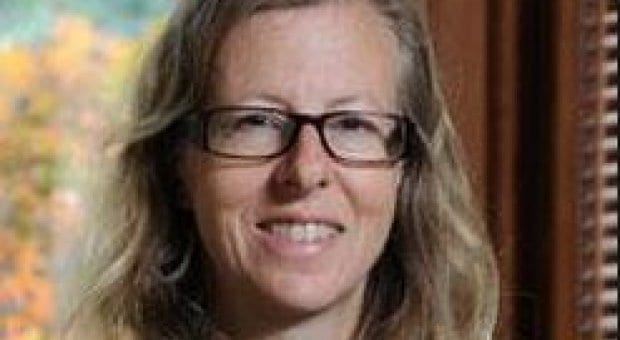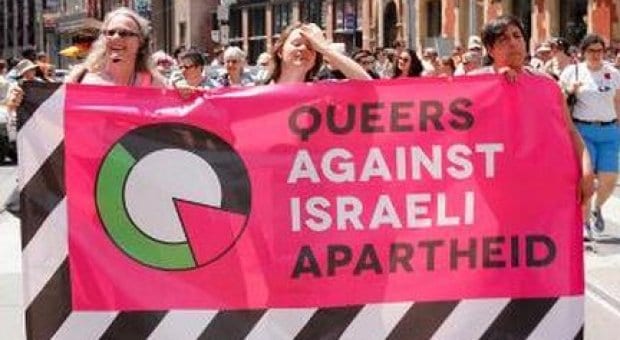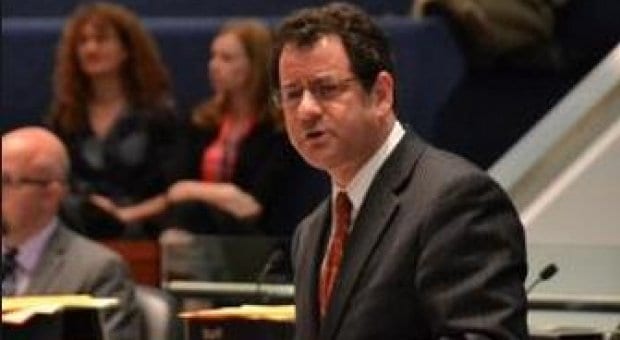
Brenda Cossman, law professor and director of the Bonham Centre for Sexual Diversity Studies at the University of Toronto. Credit: Xtra file photo

Queers Against Israeli Apartheid marching in the 2012 Dyke March. Credit: Kyle Lasky
Councillor James Pasternak has a new deal to offer Pride Toronto. He suggests giving Pride more City of Toronto funding – a “diversity bonus”— if it bans Queers Against Israeli Apartheid (QuAIA) from marching in its annual parade.
The offer comes after the executive committee voted April 23 to defer a vote on Pride funding and use of the term “Israeli apartheid” to its May 28 meeting. Three new city staff reports have once again determined that the use of the term “Israeli apartheid” at city-funded events is not a criminal offence and does not contravene any city policy.
Pasternak admits there is reluctance on council “to push Pride off a financial cliff” but adds, “the threat of withholding funding is not working.” So now he’s looking at new options, such as increasing funding if Pride bans QuAIA.
“What you do is allow Pride to keep their existing grant and provide a diversity bonus after the parade should QuAIA not participate. So we are changing the conversation to a diversity bonus,” he says.
Brenda Cossman, law professor and director of the Bonham Centre for Sexual Diversity Studies at the University of Toronto, says it sounds like a bribe.
“He really has no legal leg to stand on here,” she says. “It’s really clear, in all the city reports up to now, that it’s no problem using these words. In the city’s view it is not hate speech. And if someone wants to challenge it as hate speech, they should go to court. Try and lay a prosecution.
“Maybe this is just Pasternak’s way to keep this issue alive. If he wants to keep pushing this further, Pride will push back. The community will push back.”
Pride co-chair Francisco Alvarez laughs when asked about Pasternak’s suggestion. He calls the offer “desperate and insincere.”
“If we were offered an incentive, that would not be enough to make us ban a group from our parade that has not been shown to contravene any regulations or legislations,” he says. “Is he planning to offer an incentive to the city’s art galleries and film festivals that might at some point use those words as well? He can’t just single out one group. The city has to treat everybody the same . . . Where is he going to find all this new money?”
Pasternak wouldn’t speculate on how much the bonus would be, and he is unfazed by the idea that Pride would reject it. “That’s their prerogative. All I know is the current approach just doesn’t seem to be working,” he says.
On April 23, Councillor Shelley Carroll confirmed to Xtra that Councillor David Shiner is drafting a motion that would pull Pride’s cultural grant as punishment for QuAIA’s participation in 2012.
Pasternak says the executive committee considered a number of motions, including Shiner’s. Shiner did not respond to Xtra’s repeated requests for comment. Meanwhile, Pasternak denies Councillor Kristyn Wong-Tam’s suggestion that deferring the issue is a tactic to rally support to remove Pride’s cultural grant.
He says it was deferred because the committee ran out of time and there was no consensus on how to proceed.
Pasternak, who is not part of the executive committee, says he plans to propose that the city host “educational seminars” to explain Toronto’s anti-discrimination policy to all grant recipients.
Pasternak says the executive committee considered cutting Pride funding. “Various options were discussed. Do we delay funding? Do we pull funding? Those were discounted because the cultural-grants funding allocation was not on the agenda.”
Pasternak confirms he saw the motion to pull Pride’s funding: “the draft of a motion that I saw with red lines going through it that had to do with defunding, but was out of order. There wasn’t the rules to support it. It was just not in the cards.”
He adds, “It may have been discussed, but it’s always being discussed. That shouldn’t be a shock.” Pasternak says funding for Pride is not guaranteed. “What’s seriously discussed is deferring funding until after the parade to see whether QuAIA marched or not.”
Cossman sees Pasternak’s crusade more as an attack on Pride than on keeping out what he calls offensive speech. “This is just a new, legitimate way to beat up on Pride,” she says. “Things can be offensive. That doesn’t mean they are illegal.”
With attention turning to WorldPride next year, Pasternak says, it’s even more important to ensure QuAIA is banned. “You know, there’s deep concerns, based on comments in the press, that there is an orchestrated attempt to turn WorldPride in 2014 into an international hate-fest…There will be thousands of people here from all over the world carrying anti-Israel and anti-Jewish signage, and Toronto’s reputation will be permanently damaged. That can’t happen.”
Pasternak says he doesn’t think “world conflicts” should be a part of the Pride parade. “Do we really want to start importing world conflicts onto our streets and into our cultural festivals? That’s a dangerous path to go down.”
On April 23, Piers Handling, director and CEO of the Toronto International Film Festival, told Xtra that TIFF frequently screens films about world conflicts, including films that use the phrase “Israeli apartheid.” Handling was clear: as long as it’s not hate speech, TIFF supports free speech.
Pasternak says he is not likely to scrutinize TIFF, or other cultural organizations, in the same way because a film takes place “in a closed theatre,” as opposed to a big outdoor parade in front of a million people. “Those are two completely different things. I plan to talk to TIFF. Believe me.
“There is a mythology that there is a double standard between the Pride parade and other institutions,” he says. “That’s just not true.”
But Cossman challenges Pasternak to start policing all recipients of city funding. “Are they going to now go after all of them and make sure that nobody ever does anything with Israeli apartheid, and if they do will he take away their funding? No, they are just doing it with Pride.
“This is about one thing: free speech. We don’t need to even talk about Israeli apartheid, because that’s not the point . . . Free speech means sometimes hearing things you don’t like or are offended by. Even [anti-gay preachers can come to Pride] as long as they don’t promote hate.”

 Why you can trust Xtra
Why you can trust Xtra


